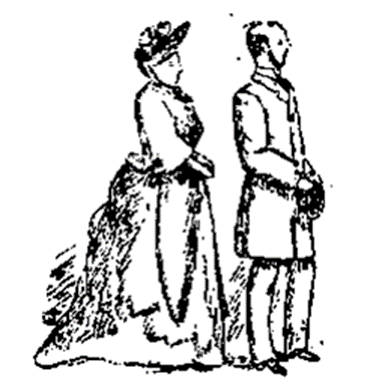This article has been transcribed from a copy of the Cardiff Times in the online collection of scanned Welsh newspapers 1804-1919 in the National Library of Wales, with grateful recognition of the free access accorded to all readers. Paragraph breaks have been introduced for easier reading.
Explanatory notes
The papers have lately been full of arguments for and against marriage: see 'Samuel’s Sentiments' no. 71 'Is Marriage a Failure?' (12 January 1889).
The Earl of Beaconsfield [Benjamin Disraeli] … in his admirable novel, Sybil: 'The married life of a woman of the working class … is a lease of woe': Disraeli has a working-class character say, 'the married life of a woman of our class in the present condition of our country is a lease of woe'.
A benedict: a newly married man; especially an apparently confirmed bachelor who eventually marries; from the name of the character in Shakespeare's Much Ado about Nothing.
better to have loved and lost: 'tis better to have loved and lost / Than never to have loved at all', Tennyson, In Memoriam A.H.H. canto 27.15-16 (1833). —— David Skilton

arriages are made in heaven. At least, so says an old-time proverb. 'If so,' replies the modern cynic, 'they are not unfrequently marred on earth.' It has long been a popular fallacy that marriage is the result of love, and the poets who come around with the onions and the flowers of spring have written much to prove the theory accurate. But experience has shown that the spring poets know more about the intricacies of rhyme than the details of matrimony, and as the stories of experience are usually more reliable than the tales of the spring rhymesters, we are bound to accept the former as a truer picture of the two. Since the days of the Greeks and Romans when elaborate preparations were made for the nuptial feast and all was festivity and joy, changes have taken place, and the aforesaid festivities have gone out before the advent of special licences and registry offices. It is one of the glories of modern civilisation that two young people can with little trouble and less expense make themselves into one at a registry office, and thus, very often, bring a life-long misery upon themselves and those belonging to them.

Single.
The late Earl of Beaconsfield, who was an earnest student of men and things, said in his admirable novel, 'Sybil': 'The married life of a woman of the working class in the present condition of our country is a lease of woe.' To which I fancy one might add with truth that the life of the middle and upper classes is frequently not much better. But they do not generally vent their spite in personal violence, and manage to keep out of the police-court, though the records of the divorce court shatter the sweets-and-honey notions of the spring poets to no small extent. I am of the opinion, sir, that marriage is oftener a failure than a success, and I will try and show how this is brought about. In the first place, sir, I think that marriages are in the present age more often than not the result of circumstances, and whatever affection may arise generally accrues more from accident than design. You see, sir, it is one of the peculiarities of English prudery that a gentleman may not pay ordinary attentions to a lady without her parents and the world coming to the conclusion that he is, or ought to be, engaged to her. The gentleman, with no notions of matrimony, but with a desire to make himself pleasant to a nice girl, is gradually drawn into an entanglement he never thought of, and eventually — after having it pointed out by interested friends that he is injuring the girl's prospects — he finds that he is almost compelled to marry the lady. I say, almost compelled, for if he refuses he is pretty certain to run the risk of a breach of promise action, in which letters that he intended as mere pleasant compliments will be paraded before the world and made to mean things he never intended them to mean. In the event of the youth preferring to risk a doubtful matrimonial life — for the results of such a marriage must perforce be doubtful — I should put such an alliance down as purely and simply a marriage of circumstance. And there are hundreds of such unions consummated yearly. In the case of the man or woman not being of a sensitive nature the match may turn out a partial success, and a state of semi-placidity will reign in the domestic arena. But if either of the parties are possessed of those terrible anatomical bugbears, nerves, there are certain to be clouds on the sky and storms in the distance. The marriage of true love is a very different affair, and if all the desired elements be present it is perhaps the nearest approach to perfect happiness this earthly life possesses. But I fear it is a thing more often heard of than experienced.

Married.
Then, sir, there is what the French call the marriage de convenance, which is a commercial arrangement worthy of a financier of the first water. No one concerned in such a marriage expects anything to accrue from it in the way of conjugal felicity. But if the couple have — between them — sufficient filthy lucre to live on in a certain style, they may, if they are agreed not to interfere with each other, jog along in a fairly comfortable way. In fact, I am inclined to think society marriages on this principle are frequently bigger successes than ordinary middle-class matches. You see, sir, they start level. They do not expect affection and therefore cannot grumble if they don't get it.

Darby and Joan – modern version.
It is a fact in which many people are interested — especially ladies — that the tendency to marry is on the wane with young men. The papers have lately been full of arguments for and against marriage and it has seemed to me that the anti-matrimonials have made out as strong a case as their opponents.

Old and crusted bachelor.
If a young man is in the receipt of a decent salary and can get along in life in a comfortable way, why should he run the risk of matrimony with its thousand and one cares and worries? As a bachelor he is free to do as he pleases, as a benedict he is handicapped in this direction by the claims and considerations of his wife and family. Therefore, being a wise man, he remains a bachelor. There are of course bachelors, sir, who are so from disappointment. Having from some cause or other lost their first love they decide not to run the risk of a second. In fact they consider, to misquote the poet:—
'Tis better to have loved and lost
Than to have wed some other girl,
and, in all probability, they are correct in their ideas. There are women, old maids, who remain single for similar reasons, and I opine there are more of them than there are bachelors from the same cause. That marriage is a necessary evil goes without-saying, but that it is in many cases more evil than necessary is equally true. There is not enough consideration given to the matter, sir, by the people interested. The ladies have too great a tendency to let their thoughts dwell upon the ceremony, the dresses, and the honey-moon, and the gentlemen are not unfrequently inspired by certain considerations in the way of sh[ed] buttons and undarned socks. The educational tendency of the age is largely fatal to the matrimonial felicity, for, however much a man may admire an intellectual woman, he is apt to think her talents a nuisance when they delay the appearance of his breakfast, or spoil the piquancy of his particular dish at dinner. Marriage, to be a success, must be based upon mutual esteem, and if this substitute for love and affection be absent, those interested may expect but a sorry time after the knot is tied at the hymeneal altar.
Last modified 6 April 2022